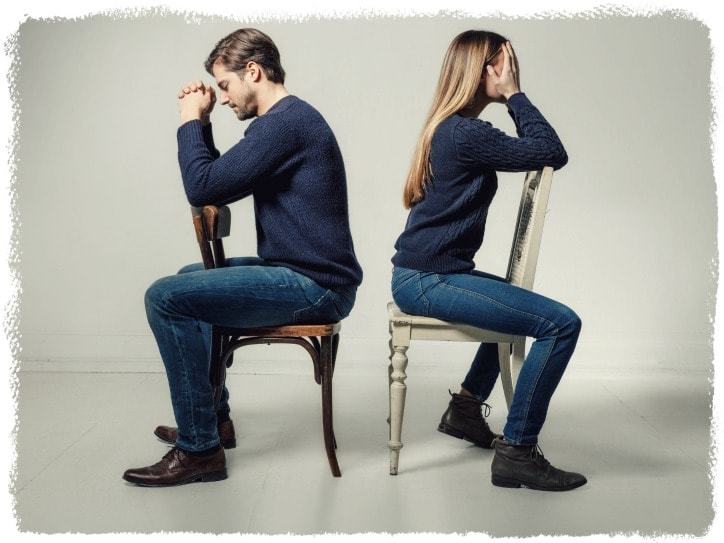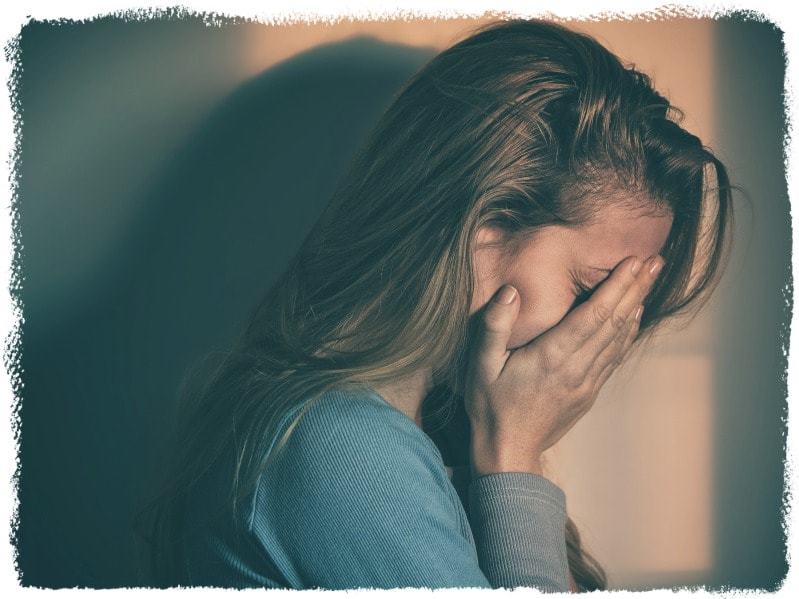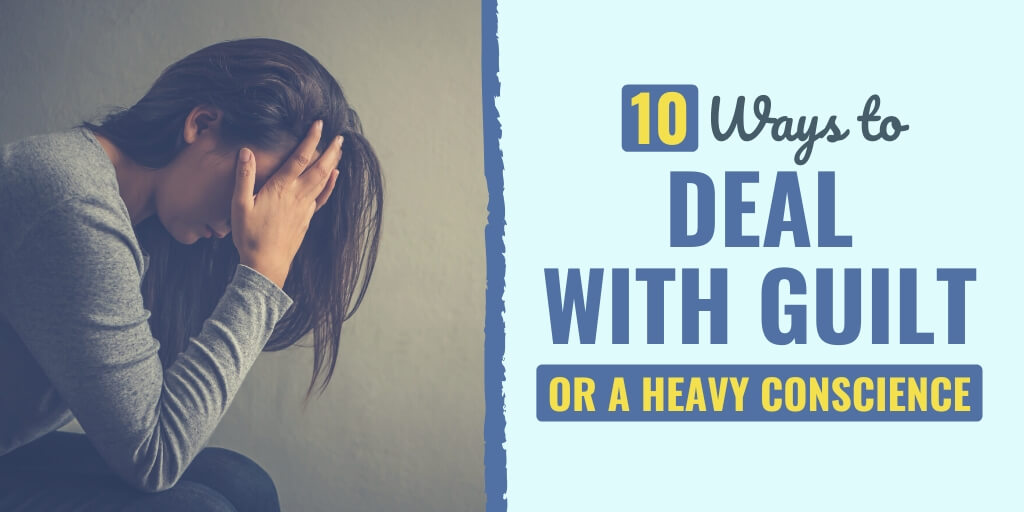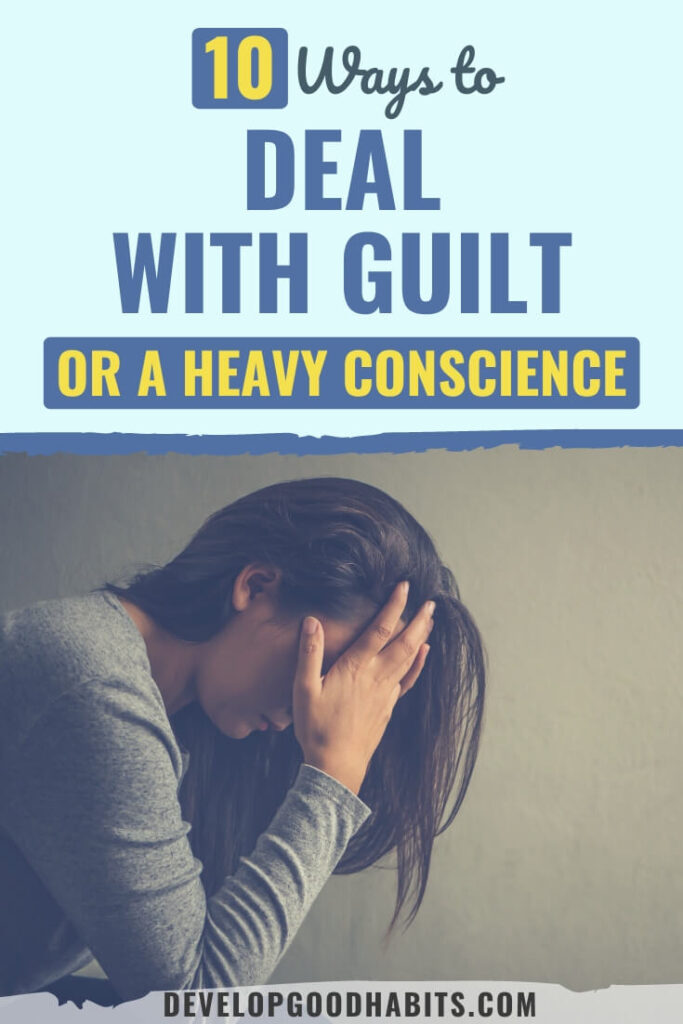Guilt is something we’ve all experienced at one point or another in our lives. If you’ve ever said or done something to hurt someone else and then experienced emotional distress, that is guilt.
But do you know how to deal with guilt?
Sure, it's appropriate to feel guilty after doing something that deserves remorse, but problems may arise if you ruminate over the guilt for an extended period of time.
There are a variety of reasons why people might have a guilty conscience.
It’s not only when we hurt someone else that we feel guilty.
For example, a full-time working mother may feel a sense of guilt for working long hours and not spending what she considers enough time with her child. Or the reverse can be true as well: A working mother might feel guilty for neglecting work whenever she’s with her family.
In this article, we’ll talk about how to deal with guilt, and provide 10 tips you can use whenever you’re experiencing a guilty conscience.
But first, let’s talk about the nature of guilt and the two kinds that are common to experience.
(Side note: Another positive way to improve your life is to read and learn something new every day. A great tool to do this is to join over 1 million others and start your day with the latest FREE, informative news from this website.)
The Two Types of Guilt
If there are two types of guilt, is there a healthy type of guilt?
Actually, yes.
Having a healthy sense of guilt is a good thing, as this feeling reminds us that we have done something wrong, and helps us correct ourselves.
It’s important to identify which type of guilt you are dealing with—either proportionate or disproportionate guilt.
Type 1: Proportionate Guilt
Proportionate guilt is a healthy feeling that is equivalent and relative to the situation at hand.
To determine if you are experiencing proportionate guilt, take a step back and review what you did, and weigh it with an objective eye. What would you think if someone else were in your shoes?
This can help you understand if you deserve the internal lectures that you are giving yourself.
The good thing about proportionate guilt is that it allows you to correct your wrongdoing because you are able to recognize its severity.
Proportionate guilt is a helpful emotion because it allows us to grow and learn from our mistakes.

When guilt emerges from hurting someone or making a negative impact that could have been prevented, our brains are being signaled to alter that behavior to avert potential consequences.
This stops us from getting away with things that we shouldn't do, and it acts as a guide for changing our behavior and correcting our sense of what is acceptable and what is not.
Many irrational beliefs hide behind guilt, which often makes it difficult to sort out your feelings.
It is important to learn how to be objective with yourself when you are feeling guilty so you are making decisions based on sound and rational thinking.
Type 2: Disproportionate Guilt
Unlike the helpful proportionate guilt that leads us to right our wrongs, disproportionate guilt is unhealthy and causes us to ruminate over situations.
Disproportionate guilt often leads to feelings of shame and resentment because the emotion you are feeling is largely out of proportion with the situation.

There are many sources from which disproportionate guilt can stem, including feeling guilty for a promotion (even though you earned it), feeling like you didn't do enough for someone who is in need, doing a better job than someone else, and not doing the things that you truly want to do.
For example, you may feel disproportionate guilt for getting a promotion when your co-worker didn't. If you got this promotion because of your hard work and dedication and you feel guilty anyway, it means you're dealing with disproportionate guilt.
This kind of guilt is irrational, and if you experience it, it is important to realize that you can't control the actions of other people.
What are the Negative Effects of Guilt?
Having unresolved guilt that persists over time can make it difficult to think straight in your everyday life. These thoughts will overflow into your work life and your personal life when you are trying to concentrate, be productive, and make decisions.
Further, it may become so important to you to always make the right decisions, to the point that you are unable to confidently make a decision for fear of it being wrong.
You may even become hesitant to enjoy your life, and begin to ignore your own wants and needs and even engage in self-punishment or self-loathing to try to get rid of these negative emotions.
People also become very sensitive when they are experiencing guilt. If you are prone to feeling guilty when it is not warranted, your “guilt alarm” tends to go off when it shouldn’t. This results in feeling guilty from over-interpreting people’s disapproval when it doesn't exist.
This sensitivity can lead you to see decisions about right and wrong in every area of your life and become obsessed with the possible impact on your actions, words, and decisions may have.
This exposure to chronic and unnecessary stress can impact your quality of life and make you feel like you constantly have to please people in order to avoid feeling guilty.
Guilt can also lead to anxiety and depression because it makes you over-conscientious.
You may over-think every action you take and consider its possible negative consequences on other people, even if this means ignoring your own needs and wants.
On the other hand, you may experience anxiety and depression if you try to repress your feelings of guilt and you are not willing to face them head-on and deal with them.
Guilt can lead you to hide behind a mask of self-denial because it makes you feel less guilty if you take care of other people before yourself. It can make you firmly believe that it is better to help others first, without realizing that guilt often becomes the motivator for your generous behaviors.
5 Examples of a Guilty Conscience
There are a lot of situations that we face in life that may cause us to feel guilty. But everyone is different, and something that may make one person feel guilty may not phase someone else in the least.
Here are some examples of situations that may lead to feelings of guilt.
Filing for Divorce
On their wedding day, most people say their vows with a strong sense of commitment. But these feelings may change over time, and someone who once felt very committed to their relationship no longer feels that bond.

It can be common to have a guilty conscience when filing for divorce because doing so may conflict with one's original intentions or values.
Abusive Situations
A victim of abuse (especially a child) may have a guilty conscience if he or she believes that they are at fault and are therefore responsible for the abuse.
These feelings of guilt resulting from abuse can be so overwhelming that a victim begins to define themselves by their abuse, which then prevents them from reaching their full potential as an adult.
Parents Who Abandon Their Children
A parent who becomes estranged from their child for whatever reason is likely to feel guilty and hold the belief that they did not try hard enough to be a good parent or maintain a familial bond with their child.
Even parents who leave their children with the intention of coming back—such as those going to war or traveling long distances for work—often have a guilty conscience as their children are left behind with only one remaining parent for an extended period of time.

On the other end of the spectrum is mom guilt—a feeling moms experience when they feel that they are not doing enough for their kids.
Cheating
People often have guilty consciences after being unfaithful in committed relationships. This guilt may manifest itself in the form of giving extra attention to one's partner or offering gifts to help soothe feelings of guilt.
People who cheat will often feel guilty when they begin to have conflicting feelings of commitment to their spouses and excitement for their new partners.
Feeling Unaccomplished Later in Life
In the later years of one's life, it is possible to either feel accomplished and satisfied with the life lived or to feel despair for not accomplishing as much as possible.
These guilty feelings stem from having lost the opportunity to live life to the fullest. Often in late adulthood, people focus on what they didn't do during their lives rather than what they did do.

10 Tips on How to Deal With Guilt
Do you ever wonder how to let go of guilt?
How do we find the balance between accepting guilty feelings when they are justified and letting them go when they're not?
Here are 10 tips to help you maintain healthy levels of guilt.
1. Don't punish yourself.
Even if whatever you did was really bad, it isn't helpful to punish yourself. Everyone does something that they end up regretting at some point, and the best thing to do is to learn from your mistakes and not repeat them.
Don't dwell on your mistake, thinking that the more you dwell on it, the more progress you are making towards redemption. While guilt may cause you to feel undeserving of happiness, don't sabotage your own well-being as a penalty.
It won't make up for your mistake, and it will create a more miserable situation. Simply ask for forgiveness and move on. (Read our post on songs about forgiveness.)
2. Forgive yourself.
In addition to asking other people for forgiveness, you need to ask yourself for forgiveness.
Being able to accomplish self-forgiveness after feelings of guilt is critical to one's self-esteem, which is an important component of enjoying life and relationships.
It is important to realize that you can forgive yourself while still knowing you were at fault, just like you would forgive someone else even if you knew they did something wrong.
You can feel regretful of your actions, but be compassionate with yourself and accept that it is okay to make mistakes sometimes. Maybe you did your best under the given circumstances at the time.
Don't be so hard on yourself that you deny yourself forgiveness.
If you want to learn how to make decisions that minimizes regrets, take a few minutes to watch the video below about the mental model often used by Jeff Bezos, the founder of Amazon.
3. Accept you were wrong.
If you did something that was wrong or hurtful, you will have to take responsibility for it, but accept that you cannot change the past.
It is critical to go through the process of understanding why you were wrong, but then you must let it go. The more you focus on the fact that you did something wrong, the more it will bother you and interfere with your life.
Guilt is typically a situational emotion, and it is nothing to get mad over. Either time will pass, or you will just realize that you shouldn't feel so bad and you end up feeling less guilty.
If you are able to recognize the issue and take action sooner instead of later, you will feel better and your guilt will be relieved.
But not doing any kind of compensatory behavior (like apologizing) will allow bad feelings to stay, and may lead to anxiety and depression. (Here's our post with step-by-step instructions on how to write an apology letter.)
Accept that you were wrong, make amends, and move on.
4. Seek professional help.
If you feel like your guilt is more than you can handle, it may be time to speak with a professional. This may be the case if it is not possible to resolve your guilty feelings with the person who was harmed, such as when one person dies before another can apologize for past behavior.
In situations such as this, psychotherapy may be appropriate.
Professionals can provide clients with exercises to practice that will help them process their emotions. A therapist could even work with a group or a family to settle issues of guilt that impact more than one person.
For some people, taking a medication may be helpful or even necessary to regain their happiness and confidence after a situation that ended in tremendous guilt. This is something that can also be discussed with a professional therapist to see if this might be the right path for you.
5. Keep track of your guilt.
When there’s a difference between who you are and who you want to be, you will experience incongruence and unhappiness.
Keeping a daily journal is the most effective habit you can start to try to fix this. If you can write down how you feel each day, you will increase your self-awareness and be able to learn how the guilt is affecting you.
Journaling will also allow you to write about all of the components of the situation that have led to your feelings of guilt. By going over what you did step-by-step and weighing it objectively, you can better understand if you deserve the inner turmoil that you are experiencing.
Using your journaling time to live in the moment and track how your feelings change over time will allow you to notice the incongruences in your life and recover from your guilt.
You will be able to figure out the small steps you need to make to creates changes in your life towards happiness.
6. You're not supposed to be perfect.
Nobody is perfect. Even people who you think live perfect lives make mistakes. Aiming to be perfect in any part of your life will never go quite as planned.
The key to realizing that perfection does not exist is to accept you are a part of humanity, and that everyone else around you is also just trying their best to make their way through life.

7. Check your behavior.
When it comes to feelings of guilt, many of us tend to lay it on thick.
Sure, sometimes this is well deserved, but usually, we exaggerate our punishment to help us feel like we have done our part. Because this is not healthy, you need to step back and reassess your behavior to determine if the amount of guilt you're allowing yourself to feel is appropriate.
This is where determining the type of guilt you are feeling (whether it is proportionate or disproportionate) is important.
Is your guilt causing you to feel stress, anxiety, or depression? If so, how are these additional feelings manifesting in your behavior? You certainly don't want to make things worse than they already are.
8. Focus on now.
Stop thinking about what could have been and focus on what is. Remember, no amount of rumination can change the past, so you are only increasing your anxiety by going over situations in your head repeatedly.
Instead, focus on the present moment and live mindfully. You have control over how you are acting and feeling right now, and there is no use in adding more despair to your life.
9. Be mindful.
There are two ways that being mindful can help you deal with feelings of guilt.
First, when you are practicing mindfulness, you are living in the moment. This means you are not thinking about your regrets or anything that happened in the past. You are only concentrating on the things in front of you in this very moment.
Secondly, if needed, you can take some time as you are practicing mindfulness to ask yourself questions and observe your responses to help bring awareness to your own feelings of guilt.
For example, one question might be, “What can I do every day to show myself that I am worthy of being happy, and to help build a new foundation of genuine confidence?”
Gaining awareness of your feelings is the first step to dealing with them in a mindful and effective way.
10. Let it go.
Eventually, you have got to just apologize and let it go. While you might still be facing the consequences of a bad decision, you can stop obsessing over them.
Stop giving yourself a hard time, and don't go overboard to try to please the person you hurt or betrayed. Their forgiveness is in their own hands
Recognize the negative consequences of holding onto the past and just let it go.
Final Thoughts on Dealing with Guilt
Guilt is a very common emotion that everyone experiences.
But it is important to identify the type of guilt you are dealing with. Be aware that not all feelings of guilt are rational and purposeful.
Remember to always be skeptical when you feel guilty—is the emotion trying to show you something rational about your behavior, or is it an extreme response to a meaningless situation?
Your answer here is your first step to helping you cope with future feelings of guilt.
There are consequences when we don’t address our guilt, such as feelings of anxiety, stress, and even depression. Make sure that you face your wrongdoing and make amends so you can tie up any loose ends with the situation before moving on.
The steps above are a great start to address your guilt and learn how to deal with the guilt in your life in a healthy manner.
Start with one or two, and take note of your progress. Once you see that you have control over your feelings of guilt, continue to work through more of the steps until you have completely let it go.
Finally, if you want another positive way to improve your life, then read and learn something new every day. A great tool to do this is to join over 1 million others and start your day with the latest FREE, informative news from this website.


